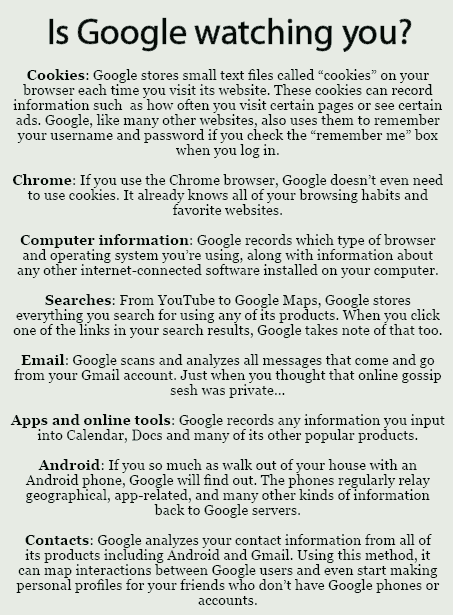“Don’t be evil.”
This is Google’s informal motto, a philosophy that’s helped it grow from a tiny dot-com startup to a Fortune 500 internet empire in just 14 years. But a new overhaul in Google’s privacy policy in effect today has many organizations fearing that it’s straying from its motto.

Internet surfers may have noticed a Jan. 24 announcement on the Google and YouTube homepages, informing them of the March 1 policy change . The new policy drew little attention from the general public. Many didn’t read the summary of the changes, but rival businesses, privacy groups and politicians have criticized the new policy.
The primary purpose of the policy change is to unify the privacy policies of over 60 separate Google products, like Gmail and Android OS. Under the new combined policy, Google will merge each user’s information profiles from all these products into a single, comprehensive profile. So if a user searches for a movie trailer on her YouTube account, she might soon see an ad for a DVD copy of the same movie on her Gmail account. Once it goes into effect, users can’t opt out of the new policy.
By signing up for a Google account, users give their consent for the company to share their information with third-party businesses for advertising purposes. But the new policy won’t change how Google collects information about users or the amount of information it gathers. Account holders can download all of the information Google has compiled about them using a tool called Google Takeout, but to completely remove their information from the company’s servers, they must delete all of their Google-affiliated accounts.
Microsoft, several members of Congress and others have raised concerns that the consolidation will provide Google with excessive or even dangerous control over its massive collection of user information. A European Union investigation into the new policy and its possible consequences may delay it until the inquiry comes to a conclusion. One watchdog organization, the Electronic Privacy Information Center, is suing the Federal Trade Commission for failing to enforce a consent order Google signed last year that prohibits it from sharing user information outside the company without express permission.
“It’s a fundamental change in Google’s business practices; it’s contrary to what they’ve told users and creates many new online privacy issues,” said EPIC executive director Marc Rotenberg in a phone interview. “Google has said lots of other things about what they’re doing to protect privacy, but this particular point is obviously a big deal.”
Google defended itself against the hailstorm of criticism Jan. 30 in an open letter to the eight members of Congress who were concerned about the policy change.
“There are two reasons why we’re updating our privacy policies: to make them simpler and more understandable, and to improve the user experience across Google,” wrote Google public policy director Pablo Chavez. “Our approach to privacy will not change. We’ll continue to focus on providing transparency, control and security to our users.”
In another serious Google privacy issue, Matthew Soble, an Apple Safari user, filed a class-action lawsuit against Google Feb. 17, claiming the company has exploited Safari software codes to install cookies or simple browser tracking software on the computers of Safari users who have opted out of accepting them. If a court deems the allegations true, Google could be subject to serious fines for its breach of user privacy.











